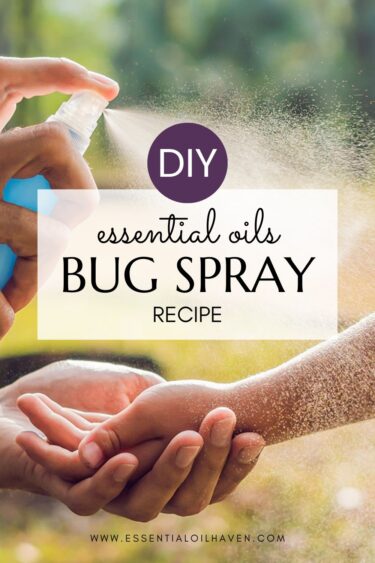 It is no secret that essential oils offer a lot of benefits, from treating scrapes and wounds to being an active ingredient in many beauty products.
It is no secret that essential oils offer a lot of benefits, from treating scrapes and wounds to being an active ingredient in many beauty products.
However, not many people know that some essential oils have natural abilities to repel insects, like mosquitoes, spiders, and other insects. Gently, yet effectively, oils used in aromatherapy act as barriers for those pesky little bugs.
Essential oil insect repellent is a timely solution, then, as people have been hunting for natural bug repellents which don’t have any side effects. There are a couple of widely-used types of pure mosquito repellents, but several experts suggest that using essential oils based sprays as mosquito repellent is preferable compared to using commercially-endorsed brands. Not only is it cheaper, but you can tailor-make a bug spray to your exact needs and desires.
This post contains affiliate links, which means if you make a purchase through these links, I may receive a small commission at no extra cost to you. Read my full disclosure policy here.
The most frequent all-natural mosquito repellent is the type that is made at home and composed of various essential oils, plus a base of witch hazel, vegetable glycerin and/or liquid vitamin E. You’ll find recipes further into this article.
To start, I would really like to explain and highlight why essential oils are a great choice for a mosquito repellent, what risks you carry by using chemical products and sprays, and the health benefits you can reap by switching to an all-natural essential oils based spray.
Why Use Essential Oils for Mosquito Repellent?
The human skin is a protective layer that stops infections and inflammations to cause internal complications directly. Thus, proper care and attention should be given to promote healthy skin.
Using products with synthetic chemicals as mosquito repellent may not be the best move if you want to protect your skin from any potential hazard. Using a natural repellent, such as essential oils, is a much safer method to repel insect bites without harmful side effects.
Synthetic insect repellent products are more convenient, not to mention that they are readily available in all leading drugstores. However, natural essential oils offer a lot of health benefits while keeping the nasty insect bites at bay.
10 Essential Oils that Repel Mosquitos
If you love to spend time outdoors but hate insect bites, worry no more!
The following ten essential oils protect your skin from awful insect bites, all the while giving you other health benefits.
Some of the oils you might already know from different uses around the house. But please familiarize yourself with these 10 oils again as you’ll be using them to make your DIY bug spray at home:
- Lavender (Lavandula Angustifolia)
- Peppermint (Mentha Piperita)
- Basil (Ocimum Basilicum)
- Pine (Pinus Slvestris)
- Lemon Eucalyptus (Eucalyptus Citriodora)
- Vetiver (Vetiveria Zizanoides)
- Tea Tree (Melaleuca Alternifolia)
- Lemongrass (Cymbopogon Citratus)
- Thyme (Thymus Vulgaris)
- Catnip (Nepeta Cataria)
Essential Oil Blends for Bug Bites
In case you prefer a simple, ready-made blend for bug bites, I can recommend the following blends:
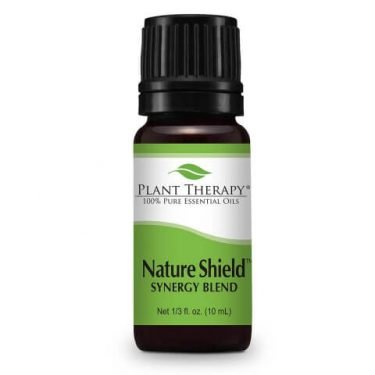
Plant Therapy’s Nature Shield blend
Get it here
- Plant Therapy‘s Nature Shield smells perfectly like a natural bug repellent. The Citronella works really well to repel pesky bugs. Plus, the blend also comes in a KidSafe version that you can find on their website.
- Simply Earth offers this Bug Fighter essential oil blend. With its simple 3-ingredient recipe of Patchouli, Lemongrass and Cedarwood, the aroma is simple and balanced, aiding to keep you bug-free this summer.
- REVIVE‘s Bugs Away blend is their version of doTerra® Terrashield®.
How to Make A Mosquito Bug Spray With Essential Oils At Home
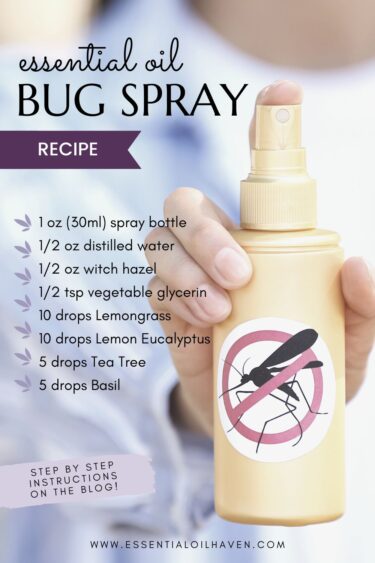
Get the following supplies to make your own bug spray:
Ingredients
- 1 oz (30 ml) amber spray bottle
- 1/2 oz distilled (or boiled) water
- 1/2 oz alcohol free witch hazel
- 10 drops Lemongrass essential oil
- 10 drops Lemon Eucalyptus essential oil
- 5 drops Tea Tree essential oil
- 5 drops Basil essential oil
Directions
- Fill your spray bottle 1/2 full with distilled or boiled water.
- Add 1/2 tsp vegetable glycerin.
- Add 30 drops of the essential oils listed above to achieve your desired scent.
- Fill with witch hazel to the top.
Use your homemade essential oil bug spray as needed throughout the day. Tweak your mosquito repellent’s scent by playing with different combinations of essential oils – starting with something where you already have the oils at home. That’s always the most economical. Then order one or two additional oils to add to your stock and start making different blends.
Recipe Variations
In case you don’t have some of the oils listed above at home already, here are some recipe blend variations I’ve also used in the past.
For your inspiration, here are bug spray essential oil blends that I’ve mixed and liked:
- 15 drops of Lavender + 15 drops of Peppermint
- 10 drops of Lemon Eucalyptus + 10 drops of Vetiver + 10 drops of Basil
Essential oils are a natural way to repel bugs and insects. Using them is not going to result in harm to the human body or the environment. They are safe but a bit less long-lasting than DEET sprays. You will need to apply your bug spray again, liberally, after a couple of hours.
If you own pets, please be careful and consult a veterinarian or other pet specialist before use. Definitely don’t let your dog lick your hand or arms immediately after you use your bug spray. Read more about safe essential oils use around dogs here.
An amber bottle vs. a regular plastic one is much better for use with essential oils as it keeps your essential oils safe by protecting them from UV light. Plus, the glass is not affected by strong oils like citrus, whereas plastic reacts to citrus oils and it is not recommended to use citrus oils together with plastics.
Health Benefits of Essential Oils as a Mosquito Repellent

Homemade Bug Spray doesn’t include harmful DEET chemicals.
Most traditional mosquito repellent products contain N,N-Diethyl-3methylbenzamide, or commonly known as DEET. Essential oils are natural and do not contain such chemicals.
Excessive use of DEET can harm the human central nervous system. Thus, it is best to use products without DEET.
Essential oils are free from harmful chemicals. They do not contain parabens and petroleum, which usually irritate sensitive skin.
While there are a number of DEET-free repellents out there, they are still not as natural as using a DIY essential oil bug spray that you can easily make at home. Even DEET-free insect repellents consist of some toxins that are damaging for human consumption. They also frequently have to get used more liberally if you want to make sure you’re utilizing the correct amount for them to be effective.
Overall, I’m just not a fan of spraying chemicals onto my skin, so I vote for natural essential oils mosquito repellent every time. Using a home made solution, I also know exactly what’s in it, and I don’t mind spraying and re-applying it as needed throughout the day.
Final Thoughts
Essential oils are a great choice to keep insect bites away! They have way fewer side effects than commercial bug sprays.
When it comes to your essential oils, quality and purity is of extreme importance. The oils act as homemade solutions for many ailments. Always make a decision that’s right for you and your family! Find the best essential oil brands here.
Organic essential oils are even more aromatic and fragrant, which can enhance the benefit of their therapeutic advantages.
What do you think about using essential oils as a mosquito repellent? Will you be trying out my homemade bug repellent recipe? Please share in the comments below. I’d love to know your thoughts.
Love This Information? Pin it to Your Favorite Pinterest Board!



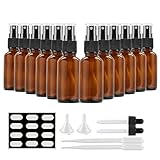




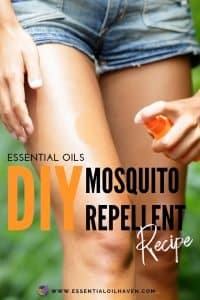
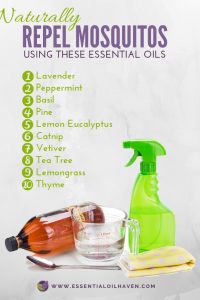
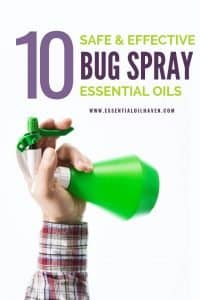
I cannot find in the article about avoiding castor oil as a carrier and I already made a batch with castor in it that I’m now afraid to use without more detail would you please tell me why it’s not good to use in EO bug spray? Thanks 😊
Hi Crystal, castor oil is a very thick carrier oil. My bug spray recipe doesn’t use any carrier oils as an ingredient as they would clog the spray nozzle. The consistency of your recipe should be quite runny (almost like water), so the spray works nicely and mists well. I don’t recommend carrier oils in a spray. Hope this helps!
Hi,
What size is the amber bottle you used??
Thanks,
Vicky
Hi Vicky, it’s a 1 oz spray bottle, 30 ml. The recipe is calculated for that size. I’ll clarify it in the recipe above right away, as well. Thank you!
Don’t you need a preservative when introducing water into the recipe since bacteria can start to grow in less than a week? I’m not sure if the witch hazel covers that. I just want to make sure I’m making a safe product. Thanks much for the great post!
My husband is allergic to coconut, it’s in glycerin. Is there an alternative product?
Yes! In this recipe, the gylcerin in used as a moisturizer and carrying agent. You can feel free to replace it with Jojoba oil or any other carrier oil of choice that’s reasonably thin. Stay away from castor oil or avocado oil, those are quite thick. If your husband is allergic to coconut oil though, perhaps choose a non-nut-related oil as well (to be safe?) such as Evening Primrose or Grapeseed. Don’t worry, it won’t clog up the spray nozzle because the quantity is only 1/2 tsp mixed into almost 16 oz of witch hazel.
Would you recommend using any of these recipes on a 18 mo old?
Hi! Thanks so much for the recipes! Is the bug spray safe to spray on a child’s skin, or should I only use it on their clothing?
Thank you!
I’m interested in making some capsules to help with my cholesterol….any ideas?
Yes, It’s true. That works perfectly fine..
Most people use commercial products to prevent mosquitoes and other defenses for their safety due to mosquito-borne diseases such as Dengue, Malaria, Yellow Fever, LaCrosse Encephalitis (LAC), West Nile Virus (WNV) etc,.
But, several people love to do Natural Mosquito Repellent by planting herbs plants around or inside the house..
Thanks for sharing. ;)
Jaime Scott PhD
Health and Wellness Advisor
The smell seemed to go away very quick, within minutes, should I put more oils in it? I did the amounts you mentioned and even used the exact bottle you referenced. Just want to make sure it is strong enough to repel them.
Question: you noted to buy a brown “glass” spray bottle to use for insect spray because a plastic bottle will react with citrus oils – this brings us a question in my mind? My diffuser, plus all others I’ve seen are made of plastic? What say you? thanks for your page
Hi Karen. Thank you for your comment- it’s a very true observation. In my article “How to clean your essential oil diffuser” here we discussed this issue in a bit more depth (check the comments). It is true that citrus oils can attack the diffuser plastics and alter it, and/or leave lasting scents in the plastics. Some people choose to have a diffuser solely for citrus oils, and another for everything else. Hope this helps!